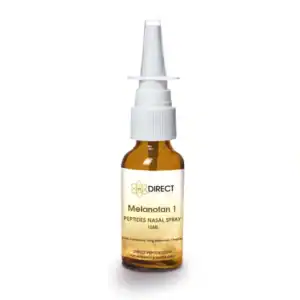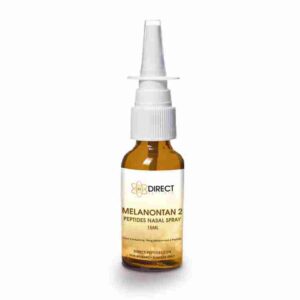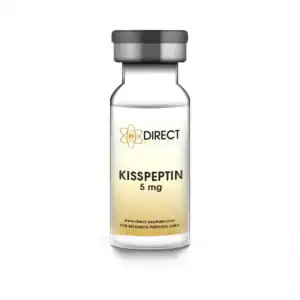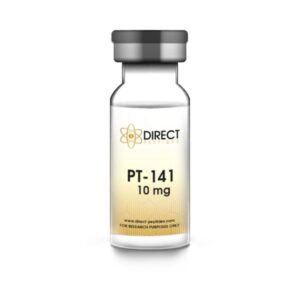Melanotan II (Melanotan 2) is a peptide that mimics the hormone responsible for producing melanin in the body. This happens when the alpha-melanocyte-stimulating hormone binds to melanocortin receptors, triggering melanin production in skin cells.
Norway Research shows that this hormone also influences sexual desire, appetite, and fat metabolism. Clinical studies have found that Melanotan II can boost libido, reduce appetite, aid fat loss, and tan the skin without sun exposure—all with few side effects.
Melanotan II has also been shown to protect against harmful UV rays by stimulating melanin production. Additionally, studies comparing Melanotan II and PT-141 suggest both peptides may help treat sexual dysfunction, including erectile dysfunction (ED) and low libido.
Melanotan 2 is a synthetic hormone that boosts melanin production, causing the skin to darken. It’s also known for its effects on increasing libido and enhancing tanning. However, its use is controversial because of safety concerns and possible side effects.
Melanotan 2 works by binding to melanocortin receptors in the brain. This triggers melanocytes in the skin to produce melanin, which darkens the skin in a way similar to how the body responds to sun exposure.
It can also impact sexual arousal by affecting the central nervous system and receptors linked to libido. Research suggests it may influence erectile function and overall sexual stimulation.
The synthetic Melanotan II peptide was first developed by the University of Arizona (UA), a public research university. The research was part of a study focused on creating a defense against skin cancer by finding a way to stimulate natural melanin production (melanogenesis) in the skin without exposing it to harmful ultraviolet (UV) radiation from sunlight.
Researchers at the University of Arizona tested the use of the naturally occurring hormone, melanocyte-stimulating hormone, on human subjects to achieve this goal. While the results were promising, the hormone’s very short half-life made it impractical for therapeutic use.
These positive findings, however, paved the way for further research and the development of Melanotan I and Melanotan II peptides. Both peptides showed similar effects but with an extended half-life, making them more suitable for practical therapeutic applications.
Melanotan II is well-known for its tanning and libido-enhancing effects, but it’s not the only peptide with these benefits. Peptides like PT-141, Kisspeptin, and Melanotan 1 are also being studied for their potential roles in sexual health and metabolism. Here’s a simple breakdown of how they compare to Melanotan II:
PT-141, also known as Bremelanotide, is a peptide in the melanocortin family designed specifically to treat sexual dysfunction, including erectile dysfunction (ED) and low sexual desire.
While Melanotan II can boost libido, PT-141 directly targets sexual function by interacting with melanocortin receptors MC3 and MC4, which influence sexual behavior, energy balance, and metabolism.
Unlike Melanotan II, PT-141 does not affect skin pigmentation. Studies show it can improve erectile function and increase sexual desire in both men and women, making it a more specialized option for addressing sexual dysfunction.
Kisspeptin is a peptide that regulates reproductive hormones. Unlike Melanotan II or Melanotan 1, it doesn’t affect skin tanning but plays a key role in sexual health and reproduction by stimulating the release of gonadotropin-releasing hormone (GnRH). This, in turn, increases sex hormone production, including estrogen and testosterone.
Research shows that Kisspeptin can enhance sexual arousal, particularly in cases of hormonal imbalances or infertility. Its potential to address conditions like hypogonadism and other reproductive disorders makes it a valuable target for sexual health research.
Melanotan 1 is part of the same peptide family as Melanotan II but is considered a milder option. Its primary role is promoting skin tanning with fewer effects on libido. Although it has some aphrodisiac properties, its main use is for achieving skin pigmentation.
Studies suggest that Melanotan 1 is generally safer for long-term use, with fewer side effects compared to Melanotan II. While it doesn’t provide the same level of libido enhancement, it may offer modest improvements in sexual function and mood, making it a suitable choice for those focused on tanning without significant changes in sexual desire.
Explore Peptide Supplies at Direct Peptides Norway for all your reconstitution requirements.
Melanotan 1 and Melanotan 2 are peptide analogues of the hormone α-MSH (α-melanocyte-stimulating hormone), known for inducing skin tanning. Unlike Melanotan 1, Melanotan 2 has also been found to boost libido, enhancing sexual arousal and sex drive. Melanotan 2 is a cyclic heptapeptide similar to α-MSH [3].
Norway Clinical trials have explored the effects of Melanotan 2 on food intake and metabolism in lab mice. The studies showed that Melanotan 2 activated the central melanocortin system when administered. A 6-day treatment reduced body fat and visceral weight in mice while also suppressing calorie intake. Discover Melanotan 2 from Direct Peptides.
Additional effects of Melanotan 2 injections included lowering serum insulin and cholesterol levels more effectively than control treatments. It also reduced acetylcholine (ACh) A carboxylase expression and prevented reductions in palmitoyl transferase I mRNA levels and carnitine in muscle tissues, particularly in obese rats.
The research indicated that Melanotan 2 enhances fat metabolism in muscle tissues and improves cholesterol processing, pointing to its potential benefits in fat catabolism and metabolic health.
α-MSH (Alpha-Melanocyte-Stimulating Hormone) is a natural hormone from the melanocortin family. It plays a key role in melanogenesis, the process that controls skin and hair pigmentation in mammals.
In addition to pigmentation, α-MSH also influences energy balance, appetite, and sexual activity. Melanotan 2 and Bremelanotide are synthetic peptides that mimic this hormone. These peptides act as nonselective agonists of the melanocortin receptors MC1, MC3, MC4, and MC5. Melanotan I and II, for example, activate the MC1 receptor, which is primarily responsible for their effects on skin pigmentation.
PT-141 (Bremelanotide) and Melanotan also target the MC3 and MC4 receptors, which regulate sexual behavior, metabolism, and appetite. However, unlike Melanotan, PT-141 does not activate the MC1 receptor. Check out PT-141 from Direct Peptides today!
Synthetic α-MSH analogues are also being researched for their ability to protect the skin from UV (ultraviolet) radiation. Bremelanotide, derived from Melanotan II, is specifically being developed to treat sexual dysfunction. These analogues are more potent than natural α-MSH and have unique selectivity profiles for different melanocortin receptors.
Melanotan 2, a synthetic melanotropic peptide, raises ethical and legal concerns due to its unregulated status in many regions. The use of Melanotan 2, primarily for tanning purposes, has led to an increase in unmonitored intake and potential health risks.
Regulatory bodies caution against its usage due to reported adverse effects and unknown long-term consequences. The legality of distribution and sale of Melanotan 2 remains questionable, emphasizing the need for strict oversight and awareness campaigns.
Before using Melanotan 2, it’s important to consult a healthcare provider, especially if you have medical conditions or take medications. Make sure you understand potential side effects, like changes in blood pressure or skin reactions.
It’s also essential to check the product’s legality and quality to avoid harmful effects. Being informed about the risks can help you make a safer decision. Always prioritize caution and safety when considering its use.
Using Melanotan 2 requires careful attention to safety. Potential side effects include nausea, loss of appetite, and possible impacts on the central nervous system. It’s important to keep an eye on your body weight, blood pressure, and any changes in skin pigmentation.
Because Melanotan 2 can also affect sexual function, people with conditions like erectile dysfunction should talk to a healthcare professional before using it. Being aware of these factors is essential for safe and effective use.
In summary, Melanotan II is a synthetic peptide linked to increased sexual motivation, function, stimulation, desire, and erectile activity, as well as tanning without UV exposure. It works similarly to the body’s natural “melanocyte-stimulating hormone,” which is thought to enhance sexual function.
Research shows that many male and female subjects who took Melanotan II reported increased sexual desire compared to those given a placebo. Bremelanotide (PT-141), a derivative of Melanotan II, has also been found to improve erectile function, suggesting it could be used to treat sexual dysfunction.
However, Melanotan II can cause side effects such as weight loss, facial flushing, nausea, and yawning. Despite its popularity on social media, particularly for tanning via nasal sprays, it’s important to note that Melanotan II is unregulated for human consumption in many countries due to safety concerns and remains under investigation.
PT-141 and Melanotan are available for purchase from Direct Peptides for research purposes only.
Melanotan 2 shows significant potential not only for enhancing skin pigmentation but also for increasing libido and improving sexual function. The peptide works by stimulating melanocortin receptors in the brain, influencing both skin tanning and sexual desire.
Norway Clinical studies suggest that Melanotan 2 can boost libido, making it a compelling option for those seeking to enhance sexual motivation. However, it is important to remember that Melanotan 2, along with other peptides like PT-141, is primarily for research purposes only.
While the peptide holds promise, especially for sexual health and fat metabolism, its use outside of controlled research environments raises ethical, safety, and legal concerns. Unregulated usage can lead to unwanted side effects, such as nausea, changes in skin pigmentation, and other systemic effects. Furthermore, Melanotan 2’s unapproved status in many regions emphasizes the need for caution and awareness.
Ultimately, if you’re considering the use of Melanotan 2 or similar peptides, it is critical to consult a healthcare provider and understand the potential risks. Research on these peptides is ongoing, and while the benefits may be intriguing, they should not overshadow the need for safety and proper regulation.
Always prioritize informed decision-making, especially when dealing with substances that are not widely approved for human use.
Shop ALL Peptide Nasal Sprays from Direct Peptides Norway today, your trusted supplier of premium clinical grade peptides online.
[1] Yuan S, Yu B, Liu HM. New drug approvals for 2019: Synthesis and clinical applications. Eur J Med Chem. 2020 Nov 1;205:112667.
[2] Lan EL, Ugwu SO, Blanchard J, Fang X, Hruby VJ, Sharma S. Preformulation studies with melanotan-II: a potential skin cancer chemopreventive peptide. J Pharm Sci. 1994 Aug;83(8):1081-4.
[3] Singh M, Mukhopadhyay K. Alpha-melanocyte stimulating hormone: an emerging anti-inflammatory antimicrobial peptide. Biomed Res Int. 2014;2014:874610.
[4] Wessells H, Levine N, Hadley ME, Dorr R, Hruby V. Melanocortin receptor agonists, penile erection, and sexual motivation: human studies with Melanotan II. Int J Impot Res. 2000 Oct;12 Suppl 4:S74-9.

Melanotan 1 Nasal Spray
£25.19 – £45.38Price range: £25.19 through £45.38 Select options This product has multiple variants. The options may be chosen on the product page
Melanotan 2 Nasal Spray
£25.19 – £81.68Price range: £25.19 through £81.68 Select options This product has multiple variants. The options may be chosen on the product page
Kisspeptin Peptide Vial
£19.94 – £47.48Price range: £19.94 through £47.48 Select options This product has multiple variants. The options may be chosen on the product page
New Reduced Price
PT-141 Peptide Vial (Bremelanotide)
£21.45 – £30.43Price range: £21.45 through £30.43 Select options This product has multiple variants. The options may be chosen on the product pageALL CONTENT AND PRODUCT INFORMATION AVAILABLE ON THIS WEBSITE IS FOR EDUCATIONAL PURPOSES ONLY.
DISCLAIMER: These products are intended solely as a research chemical only. This classification allows for their use only for research development and laboratory studies. The information available on our Norway Direct Peptides website: https://direct-peptides.com is provided for educational purposes only. These products are not for human or animal use or consumption in any manner. Handling of these products should be limited to suitably qualified professionals. They are not to be classified as a drug, food, cosmetic, or medicinal product and must not be mislabelled or used as such.